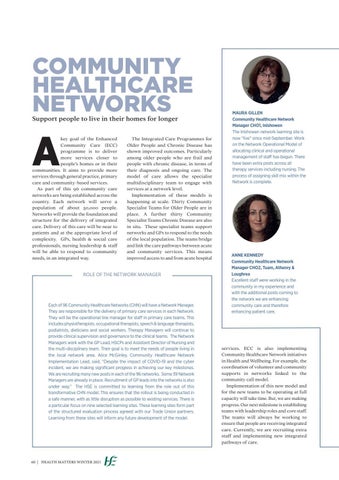COMMUNITY HEALTHCARE NETWORKS Support people to live in their homes for longer
A
key goal of the Enhanced Community Care (ECC) programme is to deliver more services closer to people’s homes or in their communities. It aims to provide more services through general practice, primary care and community-based services. As part of this 96 community care networks are being established across the country. Each network will serve a population of about 50,000 people. Networks will provide the foundation and structure for the delivery of integrated care. Delivery of this care will be near to patients and at the appropriate level of complexity. GPs, health & social care professionals, nursing leadership & staff will be able to respond to community needs, in an integrated way.
The Integrated Care Programmes for Older People and Chronic Disease has shown improved outcomes. Particularly among older people who are frail and people with chronic disease, in terms of their diagnosis and ongoing care. The model of care allows the specialist multidisciplinary team to engage with services at a network level. Implementation of these models is happening at scale. Thirty Community Specialist Teams for Older People are in place. A further thirty Community Specialist Teams Chronic Disease are also in situ. These specialist teams support networks and GPs to respond to the needs of the local population. The teams bridge and link the care pathways between acute and community services. This means improved access to and from acute hospital
ROLE OF THE NETWORK MANAGER
Each of 96 Community Healthcare Networks (CHN) will have a Network Manager. They are responsible for the delivery of primary care services in each Network. They will be the operational line manager for staff in primary care teams. This includes physiotherapists, occupational therapists, speech & language therapists, podiatrists, dieticians and social workers. Therapy Managers will continue to provide clinical supervision and governance to the clinical teams. The Network Managers work with the GP Lead, HSCPs and Assistant Director of Nursing and the multi-disciplinary team. Their goal is to meet the needs of people living in the local network area. Alice McGinley, Community Healthcare Network Implementation Lead, said, “Despite the impact of COVID-19 and the cyber incident, we are making significant progress in achieving our key milestones. We are recruiting many new posts in each of the 96 networks. Some 39 Network Managers are already in place. Recruitment of GP leads into the networks is also under way.” The HSE is committed to learning from the role out of this transformative CHN model. This ensures that the rollout is being conducted in a safe manner, with as little disruption as possible to existing services. There is a particular focus on nine selected learning sites. These learning sites form part of the structured evaluation process agreed with our Trade Union partners. Learning from these sites will inform any future development of the model.
60 | HEALTH MATTERS WINTER 2021
MAURA GILLEN Community Healthcare Network Manager CHO1, Inishowen The Inishowen network learning site is now “live” since mid-September. Work on the Network Operational Model of allocating clinical and operational management of staff has begun. There have been extra posts across all therapy services including nursing. The process of assigning skill mix within the Network is complete.
ANNE KENNEDY Community Healthcare Network Manager CHO2, Tuam, Athenry & Loughrea Excellent staff were working in the community in my experience and with the additional posts coming to the network we are enhancing community care and therefore enhancing patient care.
services. ECC is also implementing Community Healthcare Network initiatives in Health and Wellbeing. For example, the coordination of volunteer and community supports in networks linked to the community call model. Implementation of this new model and for the new teams to be operating at full capacity will take time. But, we are making progress. Our next milestone is establishing teams with leadership roles and core staff. The teams will always be working to ensure that people are receiving integrated care. Currently, we are recruiting extra staff and implementing new integrated pathways of care.
















































